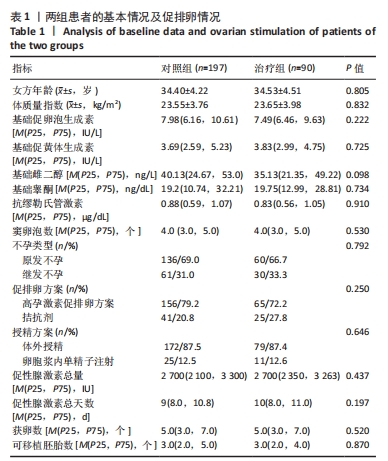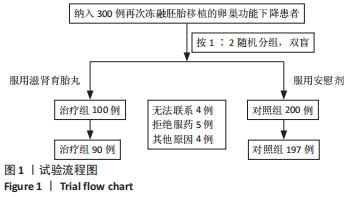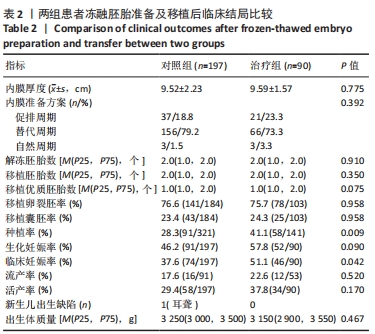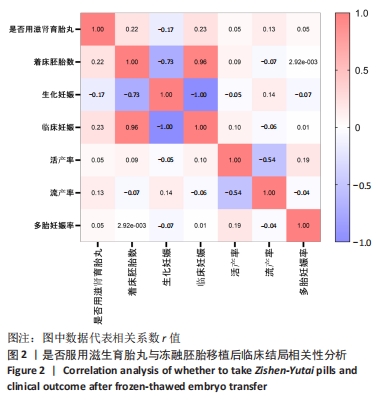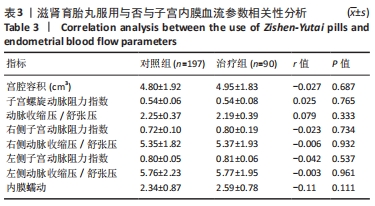中国组织工程研究 ›› 2024, Vol. 28 ›› Issue (19): 3037-3041.doi: 10.12307/2024.129
• 细胞相关实验/试验研究Cell related experimental/trial studies • 上一篇 下一篇
滋肾育胎丸在卵巢功能下降患者再次冻融胚胎移植中的作用
张敬华,白利晶,于春梅
- 常州市妇幼保健院生殖中心,江苏省常州市 213003
Effect of Zishen-Yutai pills on refrozen-thawed embryo transfer in patients with diminished ovarian reserve
Zhang Jinghua, Bai Lijing, Yu Chunmei
- Center of Reproductive Medicine, Changzhou Maternal and Child Health Care Hospital, Changzhou 213003, Jiangsu Province, China
摘要:
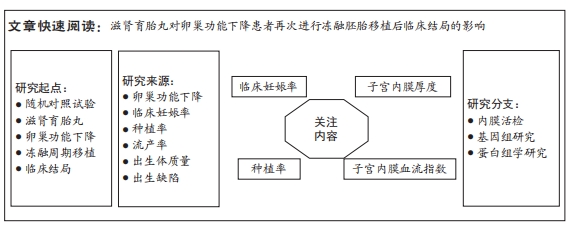
文题释义:
卵巢功能下降:是指卵巢内存留的可募集卵泡数量减少,卵泡发育障碍,并伴随卵母细胞质量降低,临床表现为月经异常及生育能力下降。流行病学显示,卵巢功能下降的发病率在一般人群中占0.9%-3%,其中20岁以前占0.01%,30岁以前占0.1%,40岁以前占约1%。卵巢作为女性的性腺器官,在维持女性特征及生殖方面扮演着重要角色。研究证实,卵巢功能下降患者如若延误病情、失治误治,在1-6年内可最终发展成为卵巢早衰。关于卵巢功能下降的病因研究尚不清楚,主要涉及年龄、遗传、免疫等因素。冻融周期移植:是一项应用广泛的辅助生殖技术,其成功妊娠的2个关键因素是发育潜能好的胚胎和准备良好的子宫内膜。冻融周期移植技术因其具有提高累积妊娠率、降低卵巢过度刺激综合征发生率等优点,在过去十余年间取得了巨大的进步,已成为人类辅助生殖技术的重要组成部分。
背景:目前西医对卵巢功能下降患者的主要治疗方法为激素替代治疗,但是这类患者对外源性激素不敏感导致治疗效果不理想。滋肾育胎丸具有养血安胎、补肾健脾、益气培元和强壮身体之功效。有研究证实滋肾育胎丸在降低卵巢功能下降患者促卵泡生成素指标和改善中医症状方面确实有一定的疗效,但是其通过改善内膜容受性提高患者种植率的研究比较少。
目的:评价滋肾育胎丸对卵巢功能下降患者再次进行冻融胚胎移植后临床结局的影响。方法:选取2019年1月至2021年12月在常州市妇幼保健院生殖中心首次失败后再次接受冻融胚胎移植助孕的300例卵巢功能下降患者为研究对象,受试者按1∶2的比例随机接受安慰剂或滋肾育胎丸治疗,治疗组100例,对照组200例,但13例患者由于无法联系、拒绝吃药或其他原因而脱落,最终治疗组90例,对照组197例纳入研究。在冻融胚胎移植前7 d开始口服药物,服用剂量为5 g/次,3次/d。研究服用滋肾育胎丸是否能改善卵巢功能下降患者再次冻融胚胎移植后的临床结局,主要结局指标为临床妊娠率、种植率、流产率、活产率以及子代出生体质量和出生缺陷等。
结果与结论:与对照组比较,口服滋肾育胎丸后临床妊娠率(P < 0.05)和种植率(P=0.009)明显提高;相关性分析显示服用滋肾育胎丸与着床胚胎数呈正相关关系(r=0.200,P=0.001),与临床妊娠呈正相关关系(r=0.235,P=0.000);服用滋肾育胎丸与子宫内膜厚度及血流的各项指标无相关性。提示:滋肾育胎丸可能改善卵巢功能下降患者再次冻融胚胎移植的临床妊娠率和种植率。
https://orcid.org/0000-0008-7556-3533 (于春梅)
中国组织工程研究杂志出版内容重点:干细胞;骨髓干细胞;造血干细胞;脂肪干细胞;肿瘤干细胞;胚胎干细胞;脐带脐血干细胞;干细胞诱导;干细胞分化;组织工程
中图分类号:
